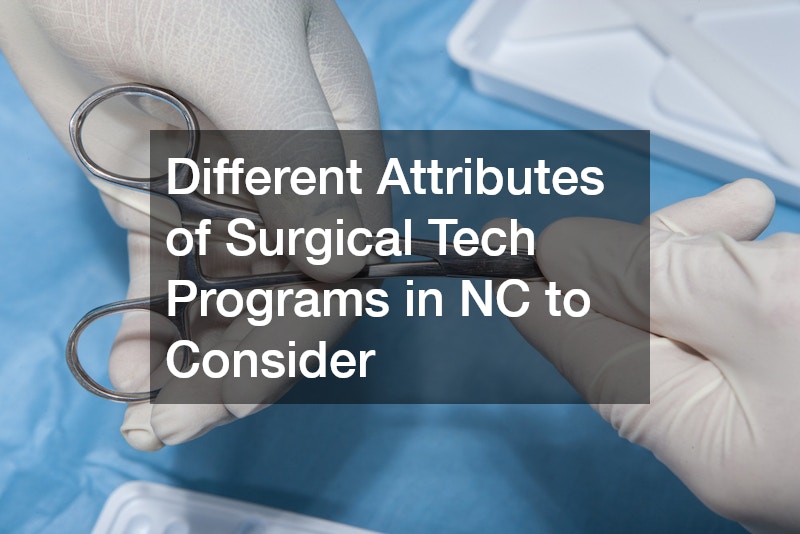Choosing the right surgical tech program is crucial for anyone aspiring to enter the field of surgical technology. In North Carolina (NC), there are numerous programs available, each with its own unique attributes. Here’s a comprehensive guide to help you consider the different attributes of surgical tech programs in NC to find the one that best suits your needs and career goals.
Accreditation
Importance of Accreditation
Accreditation ensures that a program meets the standards of quality set by the accrediting body.
In the field of surgical technology, it’s important to choose a program accredited by the Commission on Accreditation of Allied Health Education Programs (CAAHEP) or the Accrediting Bureau of Health Education Schools (ABHES). Accredited programs are recognized for their quality education and adherence to industry standards, which can be crucial for certification and employment.
State and National Recognition
Consider whether the program is recognized by both state and national accrediting bodies. This recognition ensures that the education you receive is respected across different regions and by various employers. Graduates from accredited programs are often more competitive in the job market.
Curriculum and Coursework
Comprehensive Curriculum
A comprehensive curriculum is essential for a well-rounded education in surgical technology. Look for programs that cover a wide range of topics, including anatomy and physiology, surgical procedures, sterilization techniques, and patient care. The curriculum should also include courses on medical ethics and legal issues relevant to surgical technology.
Hands-On Training
Practical, hands-on training is a crucial component of any surgical tech program. Ensure the program includes extensive laboratory sessions and clinical rotations. Hands-on experience in real surgical settings helps you develop the necessary skills and confidence to perform effectively in the operating room.
Advanced Certifications
Some programs offer advanced certifications or specialized training in areas such as cardiovascular surgery, neurosurgery, or orthopedic surgery. These additional certifications can enhance your skills and make you more attractive to potential employers.
Program Length and Structure
Duration of the Program
Surgical tech programs can vary in length, typically ranging from 12 months for a certificate or diploma program to 24 months for an associate degree. Consider how much time you can commit to your education and choose a program that fits your schedule and career timeline.
Full-Time vs. Part-Time
Some programs offer both full-time and part-time options. Full-time programs allow you to complete your education more quickly, while part-time programs offer flexibility if you need to balance school with work or other responsibilities. Assess your personal circumstances and choose the structure that best suits your needs.
Online vs. On-Campus
With the increasing availability of online education, some surgical tech programs offer online coursework. While online programs offer flexibility, they may require on-campus laboratory sessions and clinical rotations. Evaluate whether an online or on-campus format aligns with your learning style and schedule.
Clinical Rotations and Externships
Quality of Clinical Sites
The quality and variety of clinical rotation sites can significantly impact your training experience. Look for programs affiliated with reputable hospitals and surgical centers. Diverse clinical experiences expose you to different surgical environments and procedures, enhancing your practical skills.
Length and Supervision
Consider the length of the clinical rotations and the level of supervision provided. Longer rotations with experienced mentors ensure you gain sufficient hands-on experience. Adequate supervision is crucial for learning proper techniques and ensuring patient safety.
Faculty and Resources
Experienced Faculty
The expertise and experience of the faculty play a vital role in the quality of education you receive. Research the qualifications and backgrounds of the instructors. Experienced professionals with clinical backgrounds can provide valuable insights and mentorship.
Learning Resources
Access to quality learning resources, such as modern laboratories, simulation equipment, and comprehensive libraries, is essential. These resources enhance your learning experience and help you stay updated with the latest developments in surgical technology.
Job Placement and Support Services
Job Placement Rates
High job placement rates indicate a program’s success in preparing students for the workforce. Look for programs with strong job placement support and connections with local healthcare facilities. Job placement services can include resume writing assistance, interview preparation, and job fairs.
Career Support Services
Comprehensive career support services are beneficial for both current students and alumni. Services such as career counseling, networking opportunities, and continuing education can help you advance your career and stay competitive in the field.
Cost and Financial Aid
Tuition and Fees
Consider the total cost of the program, including tuition, fees, books, and supplies. Compare the costs of different programs and determine what fits within your budget. Keep in mind that higher costs do not always equate to better quality.
Financial Aid and Scholarships
Research available financial aid options, including federal and state grants, loans, and scholarships. Many programs offer financial aid to help offset the cost of education. Scholarships specifically for surgical tech students can also provide significant financial assistance.
Location and Convenience
Proximity to Home
The location of the program can affect your daily commute and overall convenience. Consider programs close to your home or workplace to minimize travel time and expenses.
Housing and Transportation
If you need to relocate for the program, consider the availability of student housing and public transportation. Some programs may offer housing assistance or have partnerships with nearby housing facilities.
.




